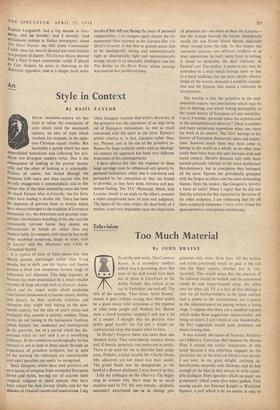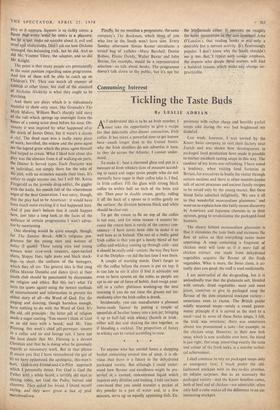Television
Too Much Material By JOHN BRAINE To set the new series, The Common Room, in a secondary modern school was a promising start. But none of the staff would have been out of place at Greyfriars or the Abbey School; they talked, as we say 'In Yorkshire, too well-off. The title of the episode, 'That Great Artist Busoni,' meant, it goes without saying, that there would be a great many mild witticisms at the expense of what some people call Modern Art. Busoni wore a beard (surprise, surprise!) and was a bit. of a twister. I thought that his pictures were pretty good myself; but I'm just a simple un- sophisticated chap who knows what he likes. ... .
In Drake's Progress there was more than one Modern Artist. They wore beards, smocks, berets and, if female, ponytails, and embraced in public. There is no need for me to describe their sculp- tures. Pathetic, wistful, lovable Mr. Charlie Drake (the adjectives are not mine) was their model. The grand finale was his masquerade as the head of a Roman gladiator. Let us leave it at that.
Like my colleague on the Observer I'm begin- ning to wonder why there must be so much material used by TV. My own remedy—probably someone's anticipated me—is to change pro- grammes only every three days. All the writers and artists concerned would be paid at the full rate for these repeats, whether live or tele- recorded. This would mean that the rewards of the talented would be trebled and the untalented would be sent empty-handed away. My other cure for 'what ails TV is a levy of five shillings a year on all licence-holders, to be spent entirely (not a penny 'to the Government, not a penny to the administrators) on paying writers a living wage. I suppose that there are a hundred reasons which make these suggestions impracticable; not being an expert, I can't think of one. Incidentally, the first suggestion would quite painlessly cut down viewing time.
It was actually the repeat of Nicholas Nirkleby on Children's Television that inspired the Braine Plan. I missed the earlier instalments of this serial because I was otherwise engaged on the particular day of the week on which it was shown; I am now, to my great delight, catching up. Serialisation naturally suits Dickens; and he had enough of the ham in him always to write speak- able dialogue. Even speeches which on paper are grotesquely stilted come alive when spoken. First among equals was Esmond Knight as Wackford Squeers, a part which is by no means as easy to Play as it appears. Squeers is so richly comic .a figure that every 'wOicIthe utters is a pleasure; but he is:too; make no mistake about it evil and cruel and abominable. Don't ask me how Dickens managed this .balancing trick, but he did. And so did Mr. Vincent Tilsey, the adaptor, and so did Mr. Knight.
The point is that many people are permanently in the same position regarding some programme. And few of them will be able to catch up on Children's TV. They can watch all manner of rubbish at other times; but stuff of the standard of Nicholas Nickleby is what they ought to be watching.
And there are plays which it is ridiculously wasteful to show only once, like Granada's The Myth Makers, William Bast's sharply told story of the cult which springs up overnight from the bones of a young actor dead before his time. Ob- viously it was inspired by what happened after the death of James Dean, but it wasn't a dratne el clef. The dead man was a really nasty piece of work; horrified, the widow and the press agent see the legend grow which the press agent himself had helped to create. What I liked best about this play was the absence from it of walking-on parts, the Dinner Is Served types. Each character was an individual, not simply there for the sake of the plot, with no existence outside their lines. It's unfair to single anyone out, but I will Mr. Kevin Fitzgerald as the juvenile drug-addict, the giggler with the knife, his mouth full of the whorehouse argot of the Beat Generation. l was sorry, though, that the play had to be American : it would have been much more exciting if it had happened here. And if you don't believe that it could happen here, just take a long look, at the faces of the audience in certain programmes I won't adver- tise by mentioning.
One showing would be quite enough, though, for The Sutulay Break, ABC's religious pro- gramme for the young men and women of today (I quote)'. These young men and young Women wear crew-neck sweaters, open-necked shirts, Sloppy Jbes, tight jeans and black stock- ings—in short, the uniform of the teenagers, which they all are. The general idea is that song (Miss Maxine Daniels) and dance (jive) at their Youth club should be punctuated by discussions on religion and ethics. But this isn't what I'd term (to quote again) using the newest methods of entertainment and information to present the oldest story of all—the Word of God. For the singing and dancing, though harmless enough, have nothing to do with the Word of God. It's the old, old principle : the bitter pill of religion needs a sugar coating. 'You mustn't think of God as an old man with a beard,' said Mr. Tom Fleming, this week's chief pill-purveyor, sincere in a collar and tie and lounge suit. I have not the least doubt that Mr. Fleming is a devout Christian and that he is doing what he genuinely regards as missionary work. But in that phrase (I assure you that I have remembered the gist of it) we have epitomised the apologetic, this-won't- hurt, God-is-my-Friend-and-Co-Pilot approach which I personally detest. For God is God the Father with ,a white beard, a terrible old man. in shining robes, not God the Padre, human and chummy. They. asked for bread, I found myself saying, and they were given a box of pink marshmallows. .Finally, .let me mention a programme, the-same., company's The Bookman, which thon of you who live in the South won't have seen. Every Sunday afternoon Simon Kester introduces a 'mixed bag of authors—Mary Burchell, Denise Robins, Elaine Dundy, Walter Baxter' arid John Braine; for example, would be a representative selection—to talk about books. The programme doesn't talk down to the public, but it's not for the Intellectuals either. It opetrLati7inioennteci John the. ;Seine assumption as the la O'Londott's, that reading books is not only a desirable but a .normal activity. It's hearteningly popular. I don't know why the South shouldn't 'See it too: But,"I repeat with savage emphasis, the 'experts who' decide these matters will find a hundred reasons which make any change im- practicable.















































 Previous page
Previous page